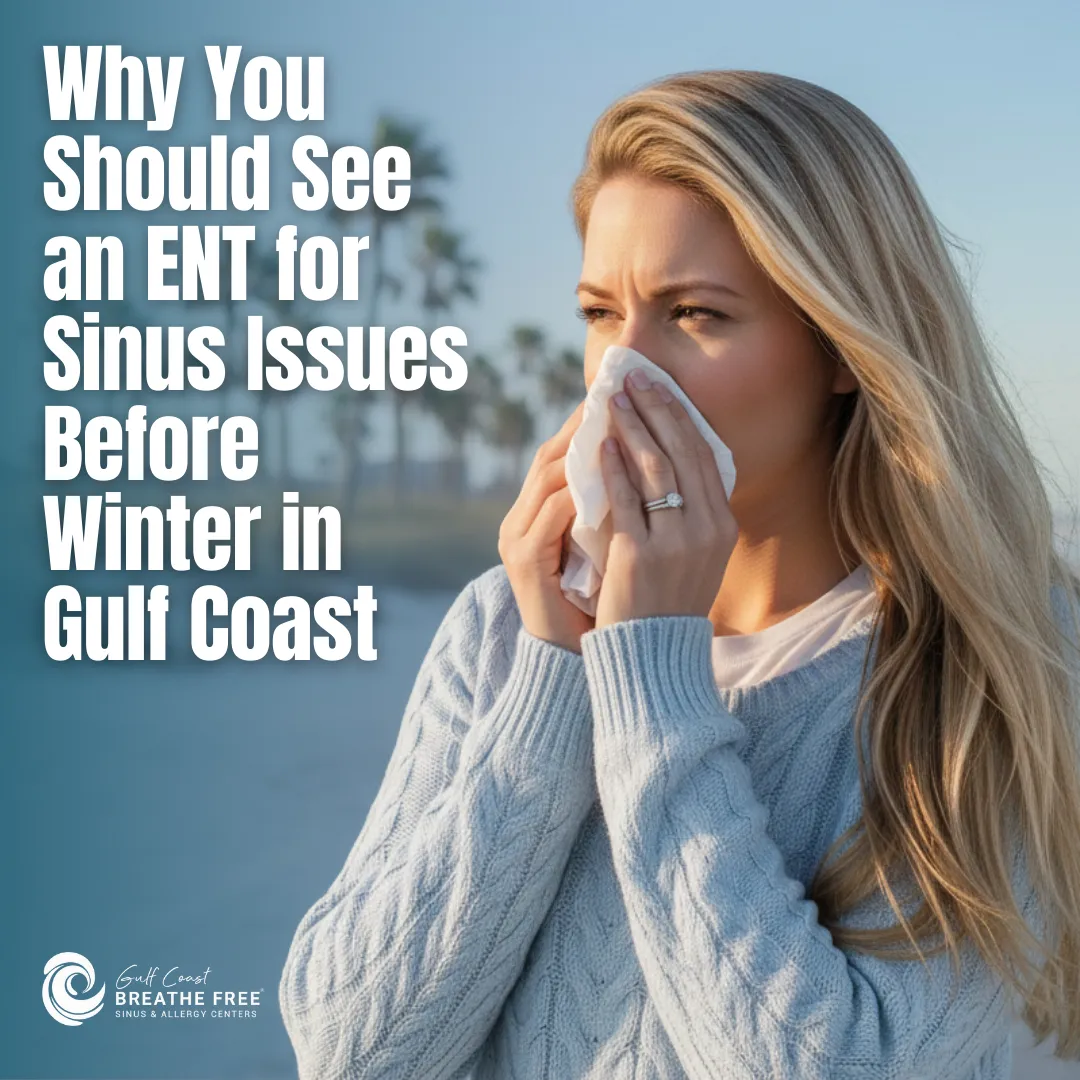Why You Should See an ENT for Sinus Issues Before Winter in Gulf Coast
As the weather shifts along the Gulf Coast, cooler air, shorter days, and increased time indoors can all affect sinus health. Many people notice more congestion, sinus pressure, or allergy flare-ups as the seasons change. In some cases, these issues may progress into recurring infections or ongoing discomfort that impacts daily life.
Seeing an ENT for sinus evaluation before winter may help you better understand your symptoms and manage them more effectively during the colder months.

How Winter Impacts Sinus Health
Even though winters in the Gulf Coast are milder than in northern states, changes in weather and indoor environments can still influence sinus health:
- Cooler, drier air: Gulf Coast winters can bring lower humidity, especially indoors when heaters are running. Dry air may irritate nasal passages and increase susceptibility to inflammation or infection.
- Persistent indoor allergens: Dust mites, mold, and pet dander can remain active in winter and may become more noticeable as we spend more time indoors.
- Cold and flu season: Viral respiratory infections are more common in winter and may contribute to sinus infections in some individuals.
These factors can make sinus symptoms more noticeable or harder to manage without medical care.
Signs It Might Be Time to See an ENT
If your symptoms last more than a few days or occur repeatedly, an ENT evaluation may be helpful. Consider scheduling a consultation if you experience:
- Sinus infections lasting longer than 10 days
- Facial pressure or discomfort that interferes with sleep
- Frequent sinus infections (three or more per year)
- Persistent nasal congestion even when you’re not sick
- Regular reliance on over-the-counter sprays or medications
An ENT can help determine whether your symptoms are caused by allergies, structural issues, or chronic sinusitis and recommend an individualized care plan.
Possible Benefits of Seeing an ENT Before Winter
An early evaluation may help you manage sinus symptoms more effectively. Depending on your condition, potential benefits include:
- Reduced risk of recurring infections: Treating inflammation and obstruction may lower the chance of sinus infections during cold and flu season.
- Improved breathing: Restoring normal airflow can support better sleep and daily comfort for some patients.
- More accurate diagnosis: Imaging and testing can help pinpoint the cause of your symptoms.
- Longer-lasting relief: Treatments ranging from prescription medications to in-office procedures like balloon sinuplasty may provide symptom relief that extends beyond one season.
Treatment outcomes vary from person to person, and your ENT will tailor recommendations to your specific needs.
Simple At-Home Tips for Winter Sinus Care
Along with medical treatment, small changes at home can support sinus health:
- Use a humidifier indoors to counteract dry air.
- Stay hydrated to keep mucus thin and easier to clear.
- Wash bedding regularly to reduce dust and allergens.
- Try saline nasal rinses to flush out irritants.
- Limit exposure to cigarette smoke, strong fragrances, and other triggers.
These habits can complement professional care and make your home environment more sinus-friendly.
Take a Proactive Approach to Sinus Health
Winter may bring cooler days and more time indoors, which can increase the risk of sinus discomfort or infection. If you’ve been experiencing persistent congestion, facial pressure, or frequent sinus problems, an ENT consultation may help you identify effective options before symptoms worsen.
At Gulf Coast Breathe Free, we offer comprehensive sinus and allergy assessments along with a range of evidence-based treatment options. Our goal is to help you breathe easier year-round with care designed around your individual needs.

.webp)